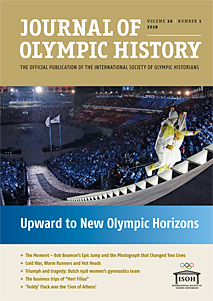
In the last edition we expressed the wish that common sense would prevail and the Olympic Winter Games would pass peacefully. This hope was not only fulfilled by the participation of a North Korean team, but those hopes were even surpassed. PyeongChang 2018 delivered proof that it makes sense to talk to one another. Now it is the responsibility of the politicians to cross the bridges erected by sport and contribute to reconciling the nations with practical action.
These same challenges also existed half a century ago when the Olympic Games, took place in Mexico City. They were also overshadowed by the political scene. David Davis remembers Bob Beamon, and tells the story of photographer Tony Duffy, then an enthusiastic parttime photographer who captured Beamon’s grandiose leap in a perfect picture and went on to launch a major international photo agency.
There is also a 50 year anniversary of the Winter Games in Grenoble. There the outstanding East German female lugers were disqualified because of “heated” runners. This is re-examined in a story which suggests they may well have been the victims of a political plot. Should the medals be redistributed for that reason? Surely not, but the rehabilitation of their reputations should not be too much to ask.
Ninety years have passed since the Olympic Games of Amsterdam in 1928, when women’s gymnastics first appeared on the programme. The host nation won gold. Yet Ruud Paauw‘s look back is painful and poignant. Of the ten gymnasts, five were Jewish and only one survived the concentration camps.
There is first hand testimony from the first Olympiad of the Modern era in Athens. Ian Jobling has transcribed letters written by Australian Edwin Flack, who won 800 and 1500 m. The Austrian Adolf Schmal, named “Filius”, won the twelve-hour cycle race in 1896. As he was a sports journalist, he personally provided an account of the longest competition ever held at Olympic Games. His career did not end there. He changed his cycle for motorcycle and then automobile. “Filius” became a leading motor sport and tourism pioneer, still revered in Austria to this day.
In the wake of Germany’s Federal Constitutional Court deciding that a “third sex” be entered in birth registers, former IAAF Vice-President Helmut Digel asks what consequences such a verdict could have for the sport of the future. Ulf Lagerström looks at Allen Woodring, the “forgotten Olympic champion” who defeated no less a figure than Charles Paddock over 200 m at the Antwerp Games in 1920.
Gunnar Meinhardt interviewed one of the oldest Olympic witnesses, 105 year old Baron Eduard von Falz-Fein from Liechtenstein, and ISOH Vice-President Christian Wacker went on the trail of the Vaduz Ski Museum, which has apparently dissolved into thin air. Last but not least: in the wake of the passing of our former General Secretary Tony Bijkerk, ISOH President David Wallechinsky pens a “Thank You”.
– Volker Kluge, Editor
Members of ISOH may view the digital version of this issue by clicking here.

There are no comments published yet.